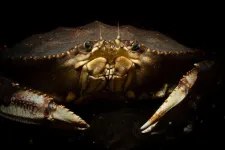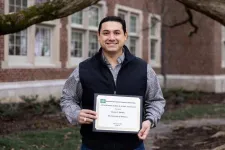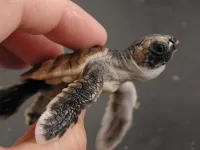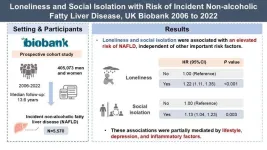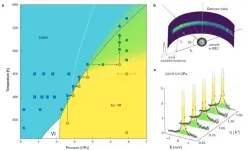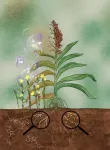(Press-News.org) Dungeness crab, Pacific herring, and red abalone are among the marine species most vulnerable to the changing climate's effect on California's coastal waters, a new study led by UC Santa Cruz researchers finds. In a paper published on February 12 in the journal PLOS Climate, the team seeks to help the California Department of Fish and Wildlife (CDFW) in its efforts to develop and implement climate-ready fisheries management strategies that adapt to challenges such as rising ocean temperatures, acidification, and deoxygenation.
The study, "A Collaborative Climate Vulnerability Assessment of California Marine Fishery Species," was led by Timothy Frawley, an assistant project scientist at UC Santa Cruz's Institute of Marine Sciences, and Mikaela Provost, an assistant professor in UC Davis's Department of Wildlife, Fish, and Conservation Biology. The study was done in close collaboration with CDFW, fisheries scientists with the National Oceanic and Atmospheric Administration (NOAA), and individuals from the Nature Conservancy and California Ocean Protection Council.
"The results are striking," said Frawley, who's based in Monterey with the ecosystem-science division of NOAA's Southwest Fisheries Science Center. "Some of California's most economically and culturally important fisheries are assessed as being among the most vulnerable to projected future environmental changes."
Prior to earning his Ph.D. in marine biology, Frawley spent five years as a commercial fisherman in California, Alaska, and Maine. So the potential threat is palpable for him, and he knows all too well how serious the impact of dispersed or greatly diminished fisheries would have on local economies and communities.
Annually, regional fishing fleets land over 8,200 tons of Dungeness crab, contributing an average over $45 million dollars to local and regional coffers each year. While this crab fishery remains one of California’s top commercial harvests, other fisheries ranked as highly vulnerable have already experienced significant declines. The recreational fishery for red abalone, which at one time was estimated to provide $24 to $44 million in annual value, has been closed since 2018; while the biomass supporting the San Francisco Bay Pacific herring fishery—which once attracted more than 400 boats—has declined by more than 75% as commercial operations have largely ceased.
"While overall across the Northeast Pacific, a species like Pacific Herring may do OK, try telling that to a herring fisherman based out of San Francisco Bay. If their resource moves hundreds of miles away, it's a big deal to them," Frawley said. "It's important to do these assessments at a scale that provides results that will be practical at the local level. So in that respect, this represents a step forward."
Species sensitivity to climate changes
In their study, the researchers evaluated the sensitivity and exposure of 34 fish and invertebrate species to projected changes in ocean conditions in California waters over two time periods to assess climate vulnerabilities: in the near future (2030-2060) and further out (2070-2100). By identifying relative vulnerabilities across this set of diverse species, the team sought to provide a foundation for integrating climate change into CDFW management and research priorities.
The study assessed vulnerability based on two key components:
Sensitivity based on species-specific biological traits like reproductive rate, habitat range, and susceptibility to ocean acidification.
Exposure to projected oceanographic changes, including sea surface temperature, salinity, acidification, upwelling, subsurface oxygen levels, and sea-level rise.
Vulnerability varied by species. Similar to the scenario regarding Pacific herring, market squid may shift north to colder waters off Oregon or Washington state, threatening significant disruption to local California fisheries. Other species, like Pacific bonito, may actually benefit from warming waters, expanding their range into the California Current.
Identifying the Most Vulnerable Species
The study categorizes species into four vulnerability levels: blue (least vulnerable), yellow, orange, and red (most vulnerable). Because red abalone are benthic (i.e., bottom-dwelling) species with limited mobility and are acutely susceptible to extreme events like marine heatwaves, these prized mollusks are classified as highly vulnerable. Over the longer time horizons—as the impacts of ocean acidification, sea level rise, and other stressors are expected to intensify—additional species such as Pacific herring, Dungeness crab, Pismo clam, and pink shrimp also fall into the red category.
Other species of concern include market squid and the California spiny lobster which, respectively, generate about $43.9 million and $10.7 million annually for the state's economy. The classification system provides a clear, intuitive framework for fisheries managers, enabling them to prioritize conservation and adaptation efforts.
"My experience working as a fisherman has inspired me to focus my work as a marine scientist on supporting coastal communities by providing them with information required to better navigate risk and uncertainty," Frawley said. "My time at sea impressed upon me the links and feedbacks between environmental variability and change and marine-resource-dependent industries and communities, as well as an appreciation for fisheries as a team sport."
Fishermen are often thought of as fiercely independent individuals. But Frawley said that's not entirely true. "To make the gears turn, it requires a team of individuals working together on deck, groups of boats sharing information; dock workers and truck drivers to unload and transport the product; buyers and processors to package and market it; and managers and scientists to set the harvest levels and ensure that operations are sustainable," he said.
The research team also included Stephanie Brodie and Mercedes Pozo Buil from UC Santa Cruz. They were joined by Lyall Bellquist, from the Nature Conservancy and Scripps Institution of Oceanography; Noah Ben-Aderet from the California Ocean Protection Council; Michael Jacox, Steven Bograd, and Elliott Hazen, all from NOAA's Southwest Fisheries Science Center; Huff McGonigal from Fathom Consulting, and CDFW's Kirsten Ramey.
This work was funded by a grant from the Resource Legacy Fund.
END
Economically, culturally important marine species vulnerable to changing climate, new study shows
New paper clearly classifies most at-risk species to help California fisheries managers prioritize efforts
2025-02-12
ELSE PRESS RELEASES FROM THIS DATE:
Tennessee professor receives SAEA Emerging Scholar Award
2025-02-12
Charles Martinez, assistant professor and Extension specialist in the Department of Agricultural and Resource Economics at the University of Tennessee Institute of Agriculture, recently received the Emerging Scholar Award from the Southern Agricultural Economics Association (SAEA). The award is presented to high-performing, early-career professionals with demonstrated research and resulting publication activity.
Martinez was chosen among peers nationwide for this distinguished honor. He received the award February 3 during the annual SAEA meeting in Irving, Texas.
“In a short time, Dr. Martinez has established himself as ...
Sea turtles’ secret GPS: researchers uncover how sea turtles learn locations using Earth's magnetic field
2025-02-12
A new study from researchers at the University of North Carolina at Chapel Hill provides the first empirical evidence that loggerhead sea turtles can learn and remember the unique magnetic signatures of different geographic regions. This discovery offers new insights into how turtles and other migratory animals navigate vast distances to reach specific foraging and breeding grounds. The findings, published in the journal Nature, also suggest that sea turtles possess two distinct magnetic senses that function differently to detect the Earth’s magnetic field.
Loggerhead turtles are famous for their extraordinary ...
Mayo Clinic researchers and surgeons test virtual reality to calm presurgery jitters
2025-02-12
ROCHESTER, Minn. — Heart surgery is a serious and invasive medical procedure, and that can be intimidating for a patient. A new study published in Mayo Clinic Proceedings suggests that virtual reality (VR) can be an effective tool to reduce preoperative anxiety in older patients undergoing their first open-heart surgery. While much of the research to date using VR involved younger patient populations, these research findings suggest that immersive VR was effective and well tolerated in older ...
Mothers with incarcerated children shoulder emotional and financial burdens
2025-02-12
The financial and emotional toll borne by mothers whose adult children have experienced incarceration is often overlooked but can exacerbate financial burdens, especially for Black mothers, according to new research from Rice University sociologist Brielle Bryan.
The study, “Maternal Wealth Implications of Child Incarceration: Examining the Upstream Consequences of Children’s Incarceration for Women’s Assets, Homeownership and Home Equity,” appears in a recent edition of Demography and explores the wealth disparities and racial inequities that intensify these burdens.
The research focuses ...
Adults can learn absolute pitch: new research challenges long-held musical belief
2025-02-12
Under embargo until 12/02/25 12:00PM EST/17:00PM GMT
It’s been a long-held belief that absolute pitch - the ability to identify musical notes without reference - is a rare gift reserved for a select few with special genetic gifts or those who began musical training in early childhood. However, new research from the University of Surrey challenges this, demonstrating that adults can acquire this skill through rigorous training.
The study involved a diverse group of 12 adult musicians, with varying levels of musical experiences, who participated in an eight-week online training program. ...
Loneliness and social isolation linked to increased risk of non-alcoholic fatty liver disease, study finds
2025-02-12
Loneliness and social isolation have been linked to an elevated risk of non-alcoholic fatty liver disease (NAFLD), according to a groundbreaking study conducted by researchers from Central South University and the Army Medical University in China, in collaboration with the Karolinska Institutet in Sweden. Published in Health Data Science, the study analyzed data from over 400,000 participants in the UK Biobank, shedding light on the far-reaching impacts of social factors on liver health.
The research team, led by Professor Jiaqi Huang and Professor Jin Chai, sought to explore whether loneliness and social isolation—two ...
Exotic observations with neutrons at the ILL
2025-02-12
In everyday life, we typically encounter water in one of three familiar states – solid, liquid or gas. But there are in fact many more phases, some of which – predicted to exist at high temperature and pressure – are so strange they’re referred to as exotic. State-of-the-art neutron spectrometers and sample environment infrastructures at the Institut Laue-Langevin (ILL) have enabled the first experimental observation of one of these exotic phases – plastic ice VII.
Plastic ice VII was originally predicted more than 15 years ago by molecular dynamics ...
Scientists discover new gene-to-gene interaction increasing risk of alopecia
2025-02-12
Scientists have discovered an interaction between genes that increases the risk of developing a type of alopecia.
In a new JAMA Dermatology study, scientists at King’s College London found that changes in two parts of the genome work together to influence alopecia risk.
Frontal fibrosing alopecia (FFA) is a highly distressing dermatological disorder which is associated with inflammation, scarring and irreversible hair loss. The disease affects an increasing number of patients worldwide and is caused by genetic and environmental factors.
The study authors conducted a meta-analysis of four cohorts ...
Chinese scientists find key genes to fight against crop parasites
2025-02-12
Chinese scientists have identified two key genes responsible for sorghum's resistance to Striga, a parasitic plant that causes significant crop losses. The breakthrough, which also highlights the potential of AI to predict key amino acid sites in strigolactone (SL) transporters, could have wide-ranging applications in enhancing parasitic plant resistance across various crops.
This study, published in Cell, was conducted by Prof. XIE Qi's team at the Institute of Genetics and Developmental ...
Lung cancer cells can go ‘off grid’
2025-02-12
Francis Crick Institute press release
Under strict embargo: 16:00hrs GMT Wednesday 12 February 2025
Peer reviewed
Experimental study
Animals, people and cells
Researchers from the Francis Crick Institute have found that some particularly aggressive lung cancer cells can develop their own electric network, like that seen in the body’s nervous system.
This unique property could make them less dependent on the environment surrounding the tumour and even spread more easily.
Small cell lung cancer (SCLC) is one of the hardest types of cancer to ...
LAST 30 PRESS RELEASES:
New study from Jeonbuk National University finds current climate pledges may miss Paris targets
Theoretical principles of band structure manipulation in strongly correlated insulators with spin and charge perturbations
A CNIC study shows that the heart can be protected during chemotherapy without reducing antitumor efficacy
Mayo Clinic study finds single dose of non-prescribed Adderall raises blood pressure and heart rate in healthy young adults
Engineered immune cells show promise against brain metastases in preclinical study
Improved EV battery technology will outmatch degradation from climate change
AI cancer tools risk “shortcut learning” rather than detecting true biology
Painless skin patch offers new way to monitor immune health
Children with poor oral health more often develop cardiovascular disease as adults
GLP-1 drugs associated with reduced need for emergency care for migraine
New knowledge on heritability paves the way for better treatment of people with chronic inflammatory bowel disease
Under the Lens: Microbiologists Nicola Holden and Gil Domingue weigh in on the raw milk debate
Science reveals why you can’t resist a snack – even when you’re full
Kidney cancer study finds belzutifan plus pembrolizumab post-surgery helps patients at high risk for relapse stay cancer-free longer
Alkali cation effects in electrochemical carbon dioxide reduction
Test platforms for charging wireless cars now fit on a bench
$3 million NIH grant funds national study of Medicare Advantage’s benefit expansion into social supports
Amplified Sciences achieves CAP accreditation for cutting-edge diagnostic lab
Fred Hutch announces 12 recipients of the annual Harold M. Weintraub Graduate Student Award
Native forest litter helps rebuild soil life in post-mining landscapes
Mountain soils in arid regions may emit more greenhouse gas as climate shifts, new study finds
Pairing biochar with other soil amendments could unlock stronger gains in soil health
Why do we get a skip in our step when we’re happy? Thank dopamine
UC Irvine scientists uncover cellular mechanism behind muscle repair
Platform to map living brain noninvasively takes next big step
Stress-testing the Cascadia Subduction Zone reveals variability that could impact how earthquakes spread
We may be underestimating the true carbon cost of northern wildfires
Blood test predicts which bladder cancer patients may safely skip surgery
Kennesaw State's Vijay Anand honored as National Academy of Inventors Senior Member
Recovery from whaling reveals the role of age in Humpback reproduction
[Press-News.org] Economically, culturally important marine species vulnerable to changing climate, new study showsNew paper clearly classifies most at-risk species to help California fisheries managers prioritize efforts
